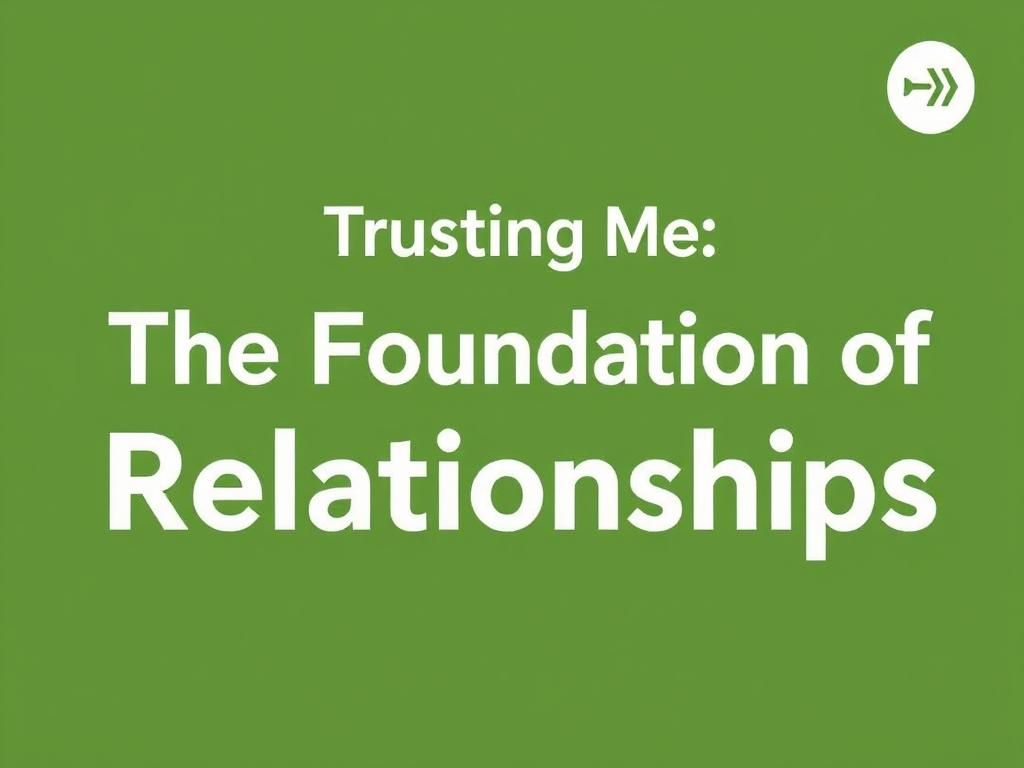Trust is a fundamental element that shapes our interactions, both personally and professionally. It serves as the invisible thread that connects individuals, fostering deeper engagement and understanding. Trusting me is not merely an expectation but a prerequisite for building meaningful relationships. In our daily lives, we seek connections that are anchored in trust, as it imparts a sense of security and stability. The implications of trust extend into decision-making processes, influencing how we perceive situations and respond to others.
Understanding Trust
What Does it Mean to Trust Someone?
To trust someone involves placing confidence in their reliability and integrity. This emotional aspect is deeply rooted in our psychological makeup, where theories like the Social Exchange Theory emphasize that trust emerges from perceived benefits in relationships. Trust thrives when individuals feel valued and respected, paving the way for authentic connections.
Types of Trust
Understanding the different types of trust is crucial for navigating various relationships effectively. These can be broadly categorized as follows:
- Personal Trust: This encompasses the trust we place in friends and family, which often stems from shared experiences and mutual respect.
- Professional Trust: In the workplace, this type involves colleagues and employers, where actions and communications shape our perception of reliability.
- Situational Trust: Situational trust is contingent upon specific circumstances, often evaluated in real-time based on behaviors and decisions.
Building Trust in Relationships
Core Components of Trust
Establishing trust requires several core components:
- Consistency: People trust those who demonstrate reliability in their actions over time.
- Integrity: Keeping promises and maintaining honesty fosters a sense of safety in relationships.
- Transparency: Open communication and sharing intentions encourage an environment where trust can flourish.
Steps to Build Trust
Building trust is a gradual process that involves:
- Being Honest and Open: Authentic dialogue invites transparency and minimizes misunderstandings.
- Showing Empathy: Understanding and acknowledging the feelings of others strengthens trust bonds.
- Practicing Active Listening: Engaging fully with what others say showcases respect and affirms their value in the relationship.
Common Barriers to Trust
Barriers can hinder the development of trust, including:
- Past Traumas and Betrayals: Previous negative experiences can create skepticism in new relationships.
- Lack of Communication: Poor communication breeds ambiguity, which can erode trust.
- Misalignment of Values: Differing core beliefs and values may lead to conflicts and distrust.
Maintaining Trust Over Time
The Role of Trust in Long-Term Relationships
In long-term relationships, trust acts as a renewable resource that needs continuous nurturing. Its presence influences the dynamics of the relationship, impacting how conflicts are managed and how love is expressed. Trust ensures mutual respect and cultivates an atmosphere of collaboration.
Strategies for Maintaining Trust
To ensure trust remains robust over time:
- Regular Check-Ins: Having open discussions about feelings and concerns can prevent misunderstandings.
- Addressing Conflicts Promptly: Tackling issues head-on promotes resolution and reinforces trust.
- Demonstrating Appreciation: Recognizing the efforts of others fosters a culture of gratitude, which is essential for trust.
Trust in a Professional Setting
Building Trust with Colleagues
Trust is a critical component of effective teamwork. It enables collaboration and encourages individuals to share ideas without fear. Creating a culture of trust in the workplace boosts morale and productivity.

Trust between Employers and Employees
The relationship between employers and employees must be anchored in trust. Transparency in communication, where expectations and feedback are clearly articulated, nurtures this trust. Empowering employees by granting authority and responsibility can further enhance their belief in the organization.
Trust and Leadership
Leaders play a pivotal role in cultivating trust within their teams. By demonstrating honesty, integrity, and vulnerability, leaders create an environment where all members feel valued, ultimately impacting organizational success.
Rebuilding Trust After Betrayal
Recognizing Signs of Broken Trust
Changes in behavior and communication patterns often signal broken trust. It may manifest as withdrawal, lack of transparency, or increased cynicism in interactions.
Steps to Rebuild Trust
Rebuilding trust is a deliberate process, involving:
- Acknowledging Past Mistakes: Taking ownership of actions contributes to healing.
- Taking Accountability: Accepting responsibility fosters a sense of security in relationships.
- Establishing New Boundaries: Communicating new commitments and boundaries reinforces trust over time.
The Role of Forgiveness
Forgiveness is integral to the process of rebuilding trust. It allows individuals to release negative feelings and fosters a sense of renewal within relationships. Understanding forgiveness can lead to healing, helping both parties move forward productively.
The Digital Age and Trust
Trust in Digital Relationships
In an increasingly digital world, the dynamics of trust have evolved. Online interactions often lack the non-verbal cues present in face-to-face communications, making it essential to establish trust through clear and consistent engagement. Privacy concerns, such as data sharing and identity theft, can significantly impact how we trust others online.
Authenticity in the Digital Landscape
Authenticity plays a crucial role in building trust in the digital realm. On social media and various platforms, being genuine and transparent attracts users, enhancing belief in the shared message. Individuals and brands that reflect authenticity in their content are more likely to foster long-lasting relationships based on trust.
| Core Components of Trust | Importance |
|---|---|
| Consistency | Builds reliability over time |
| Integrity | Establishes a foundation of honesty |
| Transparency | Encourages open communication |
| Empathy | Fosters deep emotional connections |
The Continuous Journey of Trust
Trust as an Ever-Evolving Aspect of Relationships
Trust is not static; rather, it evolves through experiences and interactions. By recognizing this dynamism, we can adopt a mindset centered around trusting me. This approach emphasizes the importance of cultivating trust consistently in both personal and professional spheres.

Call to Action
As you navigate your relationships, consider asking yourself the following reflection questions:
- How do you demonstrate trust in your interactions?
- What steps can you take today to build trust with someone?
- Are there any past experiences that impact your ability to trust?
FAQ
What are the main components of trust?
The key components of trust include consistency, integrity, and transparency.
How can I rebuild trust after it has been broken?
Rebuilding trust involves acknowledging mistakes, taking accountability, and establishing new boundaries to prevent future misunderstandings.
Why is trust important in relationships?
Trust is vital in relationships as it fosters safety, encourages open communication, and strengthens emotional bonds.
What are some common barriers to trust?
Common barriers include past traumas, lack of communication, and misalignment of values.
How does trust impact teamwork?
Trust enhances collaboration, boosts morale, and encourages open idea-sharing within teams.
What strategies can I use to maintain trust?
Regular check-ins, addressing conflicts promptly, and demonstrating appreciation are effective strategies for maintaining trust.
How does the digital age affect trust?
The digital age alters trust dynamics due to the lack of non-verbal cues and heightened privacy concerns that influence online interactions.
How important is forgiveness in rebuilding trust?
Forgiveness plays a critical role in rebuilding trust by allowing individuals to release negative feelings and fostering a renewed relationship.
What role does leadership play in building trust?
Leaders can cultivate trust through honesty, transparency, and fostering an inclusive environment for all team members.
What are the emotional aspects of trust?
The emotional aspects of trust relate to the feelings of safety, confidence, and validation that arise from trusting relationships.
What are the types of trust?
Types of trust include personal trust, professional trust, and situational trust, each serving unique roles in our interactions.
Where can I find more information about trust?
For more in-depth insights on trust, consider exploring resources like Psychology Today or books on relationship dynamics.
